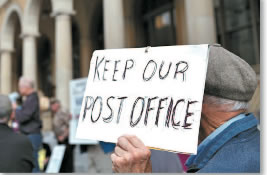

Share
As far as Mark Dimondstein is concerned, the members of the Postal Workers are going to be out in the streets even more than they already are.
Their causes? Increasing revenues for the Postal Service, stopping its creeping privatization, via Staples stores, by the Postmaster General, keeping well-paid middle-class union jobs, and enacting a plan – back to the future – that could earn the USPS almost $9 billion yearly by letting its branches be postal savings banks.
Dimondstein and his slate unseated incumbent APWU President Cliff Guffey and his allies in a contested election last year. Key issues in the vote included Guffey’s management and ineffective APWU lobbying on postal “reform” legislation.
But for Dimondstein, there’s a third threat: The agency’s scheme to staff post offices in Staples stores, using low-paid Staples workers, and not well-paid USPS workers. “The secret Staples deal is at the expense of the people of this country,” Dimondstein declares. “It’s privatization, piece by piece.
“If you put post offices in Staples stores and pay the workers $8 or $9 an hour, it’ll lead to closing post offices and a shift to non-union poverty-wage jobs from living-wage union jobs,” he told Press Associates Union News Service in an extensive interview.
APWU’s new activism against the Staples shift, which the Postal Service has described as a “pilot program” for cooperation with other retailers, has already begun. Protests in Florida, Northern California, Atlanta, Pittsburgh and elsewhere drew high-profile media attention and shone a spotlight on the USPS plan.
“The idea is to have ongoing sustained protests everywhere, capped by a National Day of Action” on the privatization issue, Dimondstein adds. The events, he hopes, “will create a grand alliance” between APWU, its members and all Americans.
The postmaster general justifies the Staples deal as one way to cut USPS personnel costs, and reduce its red ink. Though the USPS has been running a profit on first-class mail for more than a year, it’s also run billions of dollars in the red overall.
That’s because the Republican-run Congress in 2006 imposed a $5.5 billion yearly payment requirement on USPS for a decade, forcing it to pre-fund future retirees’ health care for the next 75 years. Lawmakers also refused to let the USPS recoup past pension overpayments, worth billions more, deposited in federal accounts.
The APWU, the Letter Carriers, the Mail Handlers (a Laborers sector) and the Rural Letter Carriers are all lobbying for total repeal of the health care pre-funding. USPS health care is now overfunded. But lawmakers have been cool to their pleas. Even the latest postal “reform” legislation, S1486, only reduces the pre-funding. That’s one reason the unions oppose the bill. There are others, Dimondstein adds.
“S1486 pushes privatization by inference,” he says. “If you talk about doing away with 6-day pickup and delivery and eliminate private sidewalk service” to individual mailboxes, that lower service “will drive customers into” private package delivery.
Nevertheless, the unions realize USPS must both adapt to the Internet age and make money. They back alternative legislation, by Sen. Bernie Sanders, Ind.-Vt., to open new lines of business for USPS, such as housing notary public offices, issuing fishing and hunting licenses and shipping goods now barred from the mails.

